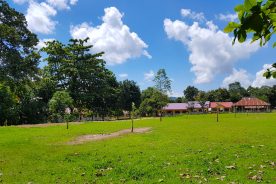“Moving the capital is just an empty slogan!” This is one of the most common reactions heard in response to President Jokowi’s sudden announcement to relocate Indonesia’s capital from Jakarta. A barrage of more cynical comments came from leading opposition politicians from Gerindra Party, such as Fadli Zon, who labelled the capital relocation plan as “omong kosong” (“bullshit”), and Arief Poyuono, who said the plan was merely an attempt from the incumbent administration to move public attention away from real problems that the government has not addressed effectively, such as the lack of accessible facilities for trade and businesses and so-called electoral irregularities.
This is not the first time that the Indonesian government wants to relocate its capital from Jakarta. Previous presidents, from Sukarno to Susilo Bambang Yudhoyono, stated their intentions to move the capital and mentioned several potential new locations, such as Palangkaraya (Central Kalimantan), Jonggol (West Java), and Sidenreng Rappang or Sidrap (South Sulawesi).
But it looks like Jokowi is committed to making the plan happen. Last May, the National Development Planning Agency (Bappenas) held a national discussion on capital relocation, at which prominent experts were invited to discuss the rationale and feasibility of the capital relocation plan with Bappenas staff. The government has included capital relocation as a part of its National Medium-Term Development Plan (RPJMN) for 2020-2025. Jokowi himself has restated that he is serious about moving the capital from Jakarta, and made several visits to prospective locations for the new capital in Kalimantan.
From a sustainability standpoint, the major question for many concerns the environmental and budgetary pros and cons of moving the capital. But as I will reflect on here, it also raises a broader question: what does moving the capital mean for efforts to promote governmental and business accountability in Indonesia? In other words, how will capital relocation influence the way civil society actors engage with the elites? To answer this question, I interviewed members of civil society—activists, researchers, and journalists, among others—who are involved in various advocacy activities promoting transparency and accountability in Indonesia. Many of them are frontline media and NGO workers who play a major role in the day-to-day operations of their respective organisations, and whose work arrangements might be significantly impacted by capital relocation.
From my conversations with them, I found out that different sectors of civil society would be impacted differently by capital relocation. Relocation would present a new major challenge for civil society actors who act as watchdogs for government and business activities, but the future of accountability politics in Indonesia is not entirely grim, since local activism, as well as collaborative work between Jakarta-based organisations and local communities in safeguarding citizens’ rights, will continue to be vibrant no matter where the capital is located.
What Indonesia can expect
A comparison with other countries that moved their capitals can give us a better sense of how capital relocation will change the way civil society actors and elites interact with each other. Take the example of Brasilia, Brazil’s federal capital since 1960. The rationale behind the construction of Brasilia to replace Brazil’s old capital Rio de Janeiro was to redistribute the fruits of development and promote a more modernist vision of the nation. But over time, Brasilia witnessed the rise of land conflicts between poor landless migrants who moved to the new capital and state authorities, suggesting that the construction of a new capital does not automatically translate into a more equitable development.
Despite this capital relocation, environmental activism remains vibrant in Brazil. Though Brasilia and other major cities are important centres for policy advocacy and lobbying activities, major environmental issues and subsequent responses to them continue to occur and coalesce in the periphery, showing how the very nature of environmental problems and activism tends to be tied to local rather than national dynamics.
Closer to Indonesia is Myanmar’s experience of moving its capital from Yangon to Naypyidaw. Analysts have different takes on what prompted the military government to move the capital: was it to promote the notion of state-led ethnic and racial unity and hinterland development, bury the memories of popular unrest in Yangon, avoid budding pro-democracy protests, or a combination thereof? Or was it because the military was too paranoid of imagined foreign invasions and put too much faith in astrological forecasts? But regardless of these analyses and speculation, it is important to note that Myanmar’s capital relocation coincided with its gradual political liberalisation, a case that mirrors Indonesia’s current capital relocation plan.
It is true that the haphazard construction of Naypyidaw has cost a fortune and shows a severe lack of sustainable urban development, as evidenced by deserted buildings and empty highways. But insofar as civil society monitoring of the government is concerned, civil society actors in Myanmar such as activists, NGOs, workers, and students have managed to divide their time and energy between Naypyidaw and Yangon and continued to exert pressure against the government.
These examples show how civil society actors in different contexts managed to conduct societal monitoring of elites and political processes, even after the centre of government and business activities have moved elsewhere. Their strategies to adjust their modes of operation and tactics could provide a useful blueprint for members of Indonesian civil society.
Here are the issues raised
Recent debates on capital relocation revolve around the cost of and budget for moving the capital, as well as its broader socio-ecological impacts. Understandably, these are the main concerns for stakeholders including policymakers and businesspeople, civil society actors, and ordinary citizens.
First of all, the budget question: how do we finance the capital relocation and is such a plan financially sound? Bappenas estimates that the capital relocation cost, which includes the move itself as well as the construction of supporting infrastructure and economic hubs for the new capital, could reach up to Rp466 trillion (A$47 billion). The cost might be cheaper if the government decides to resettle only parts of its bureaucracy. The money to finance this plan can come from four sources: state budget, state-owned enterprises, public private partnership, and the private sector.
Experts have differing opinions about the financial feasibility of this plan. Leading state officials such as Sumarsono, former regional autonomy director general of the Ministry of Home Affairs, and Ahmad Erani Yustika, the presidential special staff for economic affairs, optimistically claim that the cost for capital relocation can be reduced and that overall it is cheaper to remove the capital than remain in overburdened Jakarta. But others are more sceptical. Chatib Basri, the former Finance Minister and Douglas Ramage, the managing director of Bower Group Asia in Jakarta argue that it is unrealistic to expect the private sector to chip in the financing of capital relocation, a fair assessment given Indonesia’s continuing dependence on state-owned enterprises for infrastructure financing under Jokowi administration.
Voting out the landlords in Flores
Economic change is eroding the political power of traditional custodians of land in this part of Eastern Indonesia.
While these concerns are important, a major question is overlooked: what are the possible impacts of moving the capital for state–society accountability? More specifically, how will capital relocation influence the way civil society actors keep an eye on the government and economic elites, especially in contested policy fields?
How will capital relocation influence advocacy for accountability?
In contemporary Southeast Asia, activism for social change tends to concentrate in urban areas. This is also true for Indonesia: Jakarta has been one of the most important centres for activist work in the country. So what will happen when many activists stay in Jakarta, but the capital moves somewhere else? As I suggested earlier, I found from my interlocutors that the capital relocation plan will influence civil society works in different ways.
For example, in the eyes of an officer at an electoral monitoring non-governmental organisation (NGO), capital relocation will make civil society monitoring of government activities more much more challenging. She said, “Look, even now it is already difficult for us to join some meetings in the national parliament. It will be even more challenging if the capital is located so far away.” Another civil society worker working for a human rights NGO also concurs this assessment, saying that “this (capital relocation plan) will change the activist landscape significantly…when implemented, it might deal a heavy blow for many Jakarta-based or national NGOs.”
Both of these activists point out a major logistical problem for their organisations if the capital relocates: the increasing cost of lobbying the government or advocating for policy change. For some NGOs, capital relocation will make their work even more challenging, as it it will be much more difficult and more expensive to lobby the central government and its agencies directly, whether by setting up a new bureau or sending staff to attend meetings with government agencies in the new capital.
Several journalists also share a similar view. For a journalist who works at an online news portal, keeping an eye on the government will be more difficult if the capital relocates to another area, mostly because the logistical issues mean it will be costly to set up a new branch in the new capital, let alone regularly send journalists from Jakarta. The lack of resources is also a huge problem for many local media outlets. Commenting on whether local media will be able to handle the task of providing good quality in the new capital, a journalist at an English-language newspaper in Jakarta argued that it will be challenging for local media to oversee government activities in the new capital given their lack of capacity and budget to do in-depth investigative reporting.
These concerns are understandable. After all, the majority of resources and networks for non-governmental and journalistic works remain centred in Jakarta. Shifting the capital somewhere else will incur additional cost and effort for NGO workers and journalists to conduct their work, especially if it involves traveling to the new capital.
Environmental advocacy: a notable outlier
But things are not as challenging for those working in the environmental advocacy sector. For activists working in this space, things might not be as bad as their other colleagues predict if the capital relocates. While environmental activists generally view the capital relocation plan with high scepticism, seeing it as a waste of money and a catalyst for Indonesia’s deep socio-ecological crisis, they feel that the plan will not significantly change their methods of work and the way their institutions operate.
I asked Doni Moidady, an activist for the Indonesian Forum for the Environment (WALHI), a major environmental NGO, about the possible impact of capital relocation on WALHI’s advocacy work. He answered, “well, the transition period (moving to the new capital) will be challenging… but from our discussion so far we already entertained the possibility of moving our national office to the new capital.” Another environmental activist, Hadi Priyanto from Greenpeace Indonesia, told me, “we haven’t had any serious discussion about this (capital relocation) matter.” But as he quickly reminded me, “our (campaign) targets, whether the government or corporations, are spread (across the country),” meaning that his works will not get affected by capital relocation that much. In addition to day-to-day campaign and advocacy works, research to support such activities will not be greatly affected either. “I don’t think it will affect my work that much,” according to Aini Wilinsen, a researcher at the Mining Advocacy Network (JATAM).
Moreover, given the details of capital relocation plan are still under discussion, other activists do not really take the plan seriously. Some pointed out that in some cases local NGOs are an important player in local politics and therefore Jakarta-based NGOs can build cooperation with them if the capital relocates. Others argued that the plan is not a main concern for their organisations—at least for now. In the words of Fahmi Panimbang, the general secretary of Praksis, an organisation connecting different local labour and peasant unions, social movements, and community organisations across Indonesia: “I am sceptical that the government is serious with the plan…the plan also has no major implication for our work since we mostly work with local communities and organisations anyway.”
Furthermore, and in contrast to other organisations that rely on lobbying and elite engagement, the main mode of operation for environmental rights organisations and activists continues to be community-based work, campaign, and mobilisation. This means national offices or secretariats in Jakarta mostly serve as a connector of local activism, rather than a centre for all advocacy activities. While the occasional scaling-up of local environmental conflicts does happen, local struggles still play a major role in ensuring greater transparency and accountability in various environmental issues.
The future of accountability politics
While the exact details of capital relocation are still being discussed, it is safe to say that capital relocation will have an impact on how Jakarta-based civil society workers advocate for greater governmental and business accountability. This leads us to another question: how would this dynamic influence the way political and economic elites respond to civil society pressure post-capital relocation?
For those working in the broader accountability sectors such as political monitoring and journalism, capital relocation will make it more difficult for them to oversee government and business actors because the nature of their work requires them to maintain close interactions with those actors. As I explained above, one of the main challenges here is how to deal with the increasing cost of societal oversight of the increasingly faraway elites. Indeed, evidence from US state capitals suggests that the isolation of capital cities is associated with more corruption, less press coverage of politics, and a lessening of voters’ knowledge of and interest in politics.
But the likelihood that environmental activism will operate largely as usual even if the capital relocates suggests that there is hope for continued accountability in Indonesia. The localised nature of environmental problems in contemporary Indonesia explains the continuing vibrancy of environmental activism: severe environmental conflicts—an unintended consequence of Indonesia’s unequal and unsustainable rural development—tend to occur in far-flung rural areas. Rural activism and mass mobilisation to demand socio-ecological rights emerged as a response to these conflicts, a pattern that continues until recently. Lastly, the tested track record of environmental advocacy in Indonesia suggests that activism to promote environmental transparency and accountability will continue to be vibrant.
 Facebook
Facebook  Twitter
Twitter  Soundcloud
Soundcloud  Youtube
Youtube  Rss
Rss 



